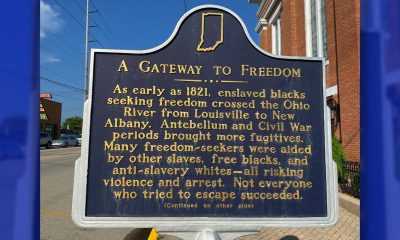Business
Small-Town Airports Close as Fewer Pilots Take to Skies

In this June 1, 2015 photo, Gene Martin, owner of Martin Field, left, manually starts the engine of an Aeronca Chief airplane as flight instructor Scott Currie, right and 12-year-old flight student Pierce Turner, right, sit in the aircraft before taking off, in South Sioux City, Neb. (AP Photo/Nati Harnik)
SCOTT McFETRIDGE, Associated Press
DES MOINES, Iowa (AP) — For the first time in 60 years, airplanes won’t be roaring down the runway at the airstrip in Onawa, Iowa, this summer. Racing dragsters will.
Like many small cities across the country, Onawa is closing its airfield largely because of the steady decline in the number of pilots, especially in rural areas. After June 30, dragsters will be using the 3,400-foot-long concrete runway.
“It was a very hard decision for our council, but they decided, it’s just not working,” said Bradley Hanson, administrator of the western Iowa city, tucked between the Missouri River and scenic Loess Hills.
Many small towns have had airfields almost since the early barnstorming days and expanded them after World War II when military pilots returned home, ready to resume work but eager to keep flying. The number of pilots with private certificates peaked at 357,000 in 1980.
Since then, though, that number has nose-dived to 188,000, and hundreds of local airfields have been closing.
Interest has waned as planes became much more costly. New small planes that cost about $13,000 in the late 1960s now go for $250,000 or more, and owners also must pay more for specialized aviation fuel, liability insurance, maintenance and hangar space.
So few planes touched down at the airport in nearby Hartley, Iowa, that the small community tore up its runway in 2010 and leased it to a farmer who now grows corn on the 80 acres.
“Nobody was buying airplanes, so when the runway and hangers needed work, they decided to do away with it,” said Howard Orchard, the town’s unofficial historian.
Likewise, officials in the 6,000 person city of Hillsboro, Illinois, also found a more profitable use for their rarely used airfield. They sold it to a company mining coal.
“It was a hard pill to swallow for me to tell these guys we had to do away with it,” said Bill Baran, the mayor at the time, who broke the bad news to local flyers. Dozens of pilots had once used the field, but only two planes were still based there when officials agreed to sell it in 2008.
The pilot decline comes even as commercial aviation is drawing more passengers, with the industry expecting to see a record number of travelers this summer.
That success has come with a price, though, as the once-flashy image of flying has been tarnished by hectic airports, packed commercial jets and frequent delays. For many people, there remains little glamour in flying.
“Air travel is not nearly as interesting as it used to be,” said Tom Haines, a pilot since 1977 and editor with the Aircraft Owners and Pilots Association.
At many small, rural airfields, where decades ago farmers, small-business owners and blue collar workers joined flying clubs and gathered for family barbecues amid the roar of planes, it now can be pretty quiet.
While some general aviation airports in urban areas remain busy, others have “a little of a ghost town feel,” said Haines.
At Martin Field in South Sioux City, Nebraska, owner Gene Martin recalls when teenagers would bike out to the airfield and pay for flight lessons with money they earned from paper routes. Now, young people seem more interested in video games, Martin said.
The number of flight instructors at his field has fallen from 12 to three, and they’re not especially busy, he said.
Still, he’s turned down offers to sell his 130 acres to housing developers.
“We’re trying to hang in there,” said Martin, whose grandfather started the airfield in the 1930s.
With the number of public airports having dropped from 5,589 in 1990 to 5,155 in 2013, pilots have more trouble finding places to keep their planes.
When the Onawa airport closes, pilot Ed Weiner will move his airplane to a city 25 miles away. If properly developed, he believes the airfield would provide more economic benefit to the town than the drag strip will.
Weiner, 70, says more people would fly small planes if they knew what the experience was like.
“If you’ve never had it, you’ll never miss it,” he said. “It’s like trying to describe the taste of chocolate cake.”
Copyright 2015 The Associated Press. All rights reserved. This material may not be published, broadcast, rewritten or redistributed.
Business
V.P. Kamala Harris: Americans With Criminal Records Will Soon Be Eligible for SBA Loans
Speaking in Las Vegas on Jan. 27, Vice President Kamala Harris announced a forthcoming federal rule that will extend access to Small Business Administration (SBA) loans to Americans who have been convicted of felonies but have served their time. Small business owners typically apply for the SBA loans to start or sustain their businesses.

By California Black Media
Speaking in Las Vegas on Jan. 27, Vice President Kamala Harris announced a forthcoming federal rule that will extend access to Small Business Administration (SBA) loans to Americans who have been convicted of felonies but have served their time.
Small business owners typically apply for the SBA loans to start or sustain their businesses.
Harris thanked U.S. Rep. Steven Horsford (D-NV-04), the chair of the Congressional Black Caucus, for the work he has done in Washington to support small businesses and to invest in people.
“He and I spent some time this afternoon with business leaders and small business leaders here in Nevada. The work you have been doing to invest in community and to invest in the ambition and natural capacity of communities has been exceptional,” Harris said, speaking to a crowd of a few hundred people at the Brotherhood of Electrical Workers Hall in East Las Vegas.
On her daylong trip, Harris was joined by Horford, SBA Administrator Isabella Guzman, Interim Under Secretary of Commerce for Minority Business Development Agency (MBDA) Eric Morrissette, and Sen. Catherine Cortez Masto (D-Nev).
“Formerly incarcerated individuals face significant barriers to economic opportunity once they leave prison and return to the community, with an unemployment rate among the population of more than 27%,” the White House press release continued. “Today’s announcement builds on the Vice President’s work to increase access to capital. Research finds that entrepreneurship can reduce recidivism for unemployed formerly incarcerated individuals by as much as 30%.”
Business
G.O.P. Lawmakers: Repeal AB 5 and Resist Nationalization of “Disastrous” Contractor Law
Republican lawmakers gathered outside of the Employee Development Department in Sacramento on Jan. 23 to call for the repeal of AB5, the five-year old California law that reclassified gig workers and other independent contractors as W-2 employees under the state’s labor code.

By California Black Media
Republican lawmakers gathered outside of the Employee Development Department in Sacramento on Jan. 23 to call for the repeal of AB5, the five-year old California law that reclassified gig workers and other independent contractors as W-2 employees under the state’s labor code.
Organizers said they also held the rally to push back against current efforts in Washington to pass a similar federal law.
“We are here to talk about this very important issue – a battle we have fought for many years – to stop this disastrous AB 5 policy,” said Assembly Republican Leader James Gallagher (R-Yuba City).
Now, that threat has gone national as we have seen this new rule being pushed out of the Biden administration,” Gallagher continued.
On Jan. 10, the U.S. Department of Labor issued a new rule providing guidance on “on how to analyze who is an employee or independent contractor under the Fair Labor Standards Act (FLSA).”
“This final rule rescinds the Independent Contractor Status Under the Fair Labor Standards Act rule (2021 IC Rule), that was published on January 7, 2021, and replaces it with an analysis for determining employee or independent contractor status that is more consistent with the FLSA as interpreted by longstanding judicial precedent,” a Department of Labor statement reads.
U.S. Congressmember Kevin Kiley (R-CA-3), who is a former California Assemblymember, spoke at the rally.
“We are here today to warn against the nationalization of one of the worst laws that has ever been passed in California, which has devastated the livelihoods of folks in over 600 professions,” said Kiley, adding that the law has led to a 10.5% decline in self-employment in California.
Kiley blamed U.S Acting Secretary of Labor, July Su, who was the former secretary of the California Labor and Workforce Development Agency, for leading the effort to redefine “contract workers” at the federal level.
Kiley said two separate lawsuits have been filed against Su’s Rule – its constitutionality and the way it was enacted, respectively. He said he is also working on legislation in Congress that puts restrictions on the creation and implementation of executive branch decisions like Su’s.
Assemblymember Kate Sanchez (R-Rancho Santa Margarita) announced that she plans to introduce legislation to repeal AB 5 during the current legislative session.
“So many working moms like myself, who are also raising kids, managing households, were devastated by the effects of AB 5 because they lost access to hundreds of flexible professions,” Sanchez continued. “I’ve been told by many of these women that they have lost their livelihoods as bookkeepers, artists, family caregivers, designers, and hairstylists because of this destructive law.”
Activism
Oakland Post: Week of April 10 – 16, 2024
The printed Weekly Edition of the Oakland Post: Week of April 10 – 16, 2024

To enlarge your view of this issue, use the slider, magnifying glass icon or full page icon in the lower right corner of the browser window. ![]()
-

 Activism4 weeks ago
Activism4 weeks agoOakland Post: Week of March 20 – 26, 2024
-

 #NNPA BlackPress3 weeks ago
#NNPA BlackPress3 weeks agoCOMMENTARY: D.C. Crime Bill Fails to Address Root Causes of Violence and Incarceration
-

 #NNPA BlackPress3 weeks ago
#NNPA BlackPress3 weeks agoMayor, City Council President React to May 31 Closing of Birmingham-Southern College
-

 #NNPA BlackPress3 weeks ago
#NNPA BlackPress3 weeks agoCOMMENTARY: Lady Day and The Lights!
-

 #NNPA BlackPress3 weeks ago
#NNPA BlackPress3 weeks agoFrom Raids to Revelations: The Dark Turn in Sean ‘Diddy’ Combs’ Saga
-

 #NNPA BlackPress3 weeks ago
#NNPA BlackPress3 weeks agoBaltimore Key Bridge Catastrophe: A City’s Heartbreak and a Nation’s Alarm
-

 #NNPA BlackPress3 weeks ago
#NNPA BlackPress3 weeks agoBaltimore’s Key Bridge Struck by Ship, Collapses into Water
-

 Activism3 weeks ago
Activism3 weeks agoOakland Post: Week of March 27 – April 2, 2024




















































